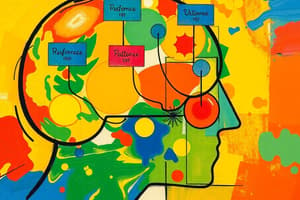Podcast
Questions and Answers
Which of the following is not a component of Atkinson and Shiffrin’s modal model of memory?
Which of the following is not a component of Atkinson and Shiffrin’s modal model of memory?
- Working memory (correct)
- Short-term memory
- Long-term memory
- Sensory memory
What is the auditory sensory memory called?
What is the auditory sensory memory called?
- Phonological loop
- Echoic memory (correct)
- Iconic memory
- Central executive
Which reinforcement schedule delivers reinforcement with a constant time delay following the behavior?
Which reinforcement schedule delivers reinforcement with a constant time delay following the behavior?
- Variable interval
- Fixed interval (correct)
- Fixed ratio
- Continuous reinforcement
What does reasoning involve in cognitive processes?
What does reasoning involve in cognitive processes?
Which of the following statements primarily describes thinking?
Which of the following statements primarily describes thinking?
Which cognitive process is defined as the mental representation of stimuli and events?
Which cognitive process is defined as the mental representation of stimuli and events?
In which type of reinforcement schedule does reinforcement occur after an unpredictable number of responses?
In which type of reinforcement schedule does reinforcement occur after an unpredictable number of responses?
What encompasses the set of cognitive processes required to reach a goal while overcoming obstacles?
What encompasses the set of cognitive processes required to reach a goal while overcoming obstacles?
What does the heuristic of working backwards focus on?
What does the heuristic of working backwards focus on?
According to Gestalt psychology, what is crucial for effective problem solving?
According to Gestalt psychology, what is crucial for effective problem solving?
What is meant by 'insight' in the context of problem solving?
What is meant by 'insight' in the context of problem solving?
How does problem representation influence problem solving?
How does problem representation influence problem solving?
Which of the following best describes the process of restructuring?
Which of the following best describes the process of restructuring?
What type of problems are often associated with insights according to Gestalt psychology?
What type of problems are often associated with insights according to Gestalt psychology?
What is the significance of a subjective feeling of progress during problem solving?
What is the significance of a subjective feeling of progress during problem solving?
In the context of chains as a problem type, what aspect is often focused on?
In the context of chains as a problem type, what aspect is often focused on?
What does functional fixedness refer to in problem-solving?
What does functional fixedness refer to in problem-solving?
What is primarily represented by a prototype?
What is primarily represented by a prototype?
How does mental set influence problem-solving?
How does mental set influence problem-solving?
What fundamentally constitutes a problem according to the given definition?
What fundamentally constitutes a problem according to the given definition?
What is convergent thinking?
What is convergent thinking?
What may hinder creative problem solving according to the content?
What may hinder creative problem solving according to the content?
Which step is NOT part of the problem-solving process outlined?
Which step is NOT part of the problem-solving process outlined?
What is meant by divergent thinking?
What is meant by divergent thinking?
In the Tower of Hanoi, what is referred to as the problem space?
In the Tower of Hanoi, what is referred to as the problem space?
In Maier’s two-string problem, what did the participants primarily struggle with?
In Maier’s two-string problem, what did the participants primarily struggle with?
Which method involves structured, step-by-step problem resolution?
Which method involves structured, step-by-step problem resolution?
What is the primary goal of means-end analysis?
What is the primary goal of means-end analysis?
What is a common reason for poor problem-solving performance?
What is a common reason for poor problem-solving performance?
What was the observed outcome of providing a hint in the two-string problem?
What was the observed outcome of providing a hint in the two-string problem?
Which of the following is NOT listed as a method of problem-solving?
Which of the following is NOT listed as a method of problem-solving?
What does the term 'initial state' refer to in problem structure?
What does the term 'initial state' refer to in problem structure?
Flashcards
Concept
Concept
The idea that represents stimuli, objects, or categories.
Prototype
Prototype
The best representative of a category.
Problem
Problem
A situation where an obstacle blocks the way from the current state to the desired goal.
Initial State
Initial State
Signup and view all the flashcards
Goal State
Goal State
Signup and view all the flashcards
Operations
Operations
Signup and view all the flashcards
Problem Space
Problem Space
Signup and view all the flashcards
Trial and Error
Trial and Error
Signup and view all the flashcards
Which is not part of the modal model of memory?
Which is not part of the modal model of memory?
Signup and view all the flashcards
What is the auditory sensory memory?
What is the auditory sensory memory?
Signup and view all the flashcards
What is a fixed interval schedule?
What is a fixed interval schedule?
Signup and view all the flashcards
What is thinking?
What is thinking?
Signup and view all the flashcards
What is problem-solving?
What is problem-solving?
Signup and view all the flashcards
What is reasoning?
What is reasoning?
Signup and view all the flashcards
What are mental images?
What are mental images?
Signup and view all the flashcards
What are mental representations?
What are mental representations?
Signup and view all the flashcards
Confirmation Bias
Confirmation Bias
Signup and view all the flashcards
Mental Set
Mental Set
Signup and view all the flashcards
Functional Fixedness
Functional Fixedness
Signup and view all the flashcards
Creativity
Creativity
Signup and view all the flashcards
Convergent Thinking
Convergent Thinking
Signup and view all the flashcards
Divergent Thinking
Divergent Thinking
Signup and view all the flashcards
Idea Generation
Idea Generation
Signup and view all the flashcards
Knowledge hindering Creativity
Knowledge hindering Creativity
Signup and view all the flashcards
Working Backwards
Working Backwards
Signup and view all the flashcards
Gestalt Approach to Problem Solving
Gestalt Approach to Problem Solving
Signup and view all the flashcards
Restructuring a Problem
Restructuring a Problem
Signup and view all the flashcards
Insight
Insight
Signup and view all the flashcards
Insight Problems
Insight Problems
Signup and view all the flashcards
Restructuring Ability
Restructuring Ability
Signup and view all the flashcards
Restructuring Problems
Restructuring Problems
Signup and view all the flashcards
Dot Triangle Problem
Dot Triangle Problem
Signup and view all the flashcards
Study Notes
Psychology 100: Thinking, Intelligence, Language
- PSYC100 is a course offered at Koç University during Fall 2024.
- The course covers topics related to thinking, intelligence, and language.
Atkinson and Shiffrin's Modal Model of Memory
- Components of the model are long-term memory, sensory memory, short-term memory, and working memory.
- Working memory is not a component of the Atkinson & Shiffrin model.
Auditory Sensory Memory
- Echoic memory is the auditory sensory memory.
Reinforcement Schedules
- A fixed-interval reinforcement schedule delivers reinforcement after a constant time interval, regardless of the behavior.
Thinking, Problem Solving, and Reasoning
- Thinking involves mentally representing aspects of the world, including oneself, and transforming these representations to achieve goals.
- Problem solving involves cognitive processes used to overcome obstacles to achieve a goal.
- Reasoning uses cognitive processes to draw conclusions from knowledge.
Elements of Thinking
- Mental images are mental representations of stimuli and events.
- Concepts are ideas that represent stimuli, objects, and categories.
- A prototype is the best representative of a concept's category.
What is a Problem?
- A problem is a situation where an obstacle exists between a current state and a desired goal state, making a solution less obvious.
- Problems can have clear solutions or be complex. An example problem: How to manage a sitting arrangement at a wedding?
How to Solve a Problem
- Problem-solving steps include identifying the problem, representing the problem, and taking actions to reach the goal.
Problem Structure
- The structure of a problem includes the initial state (starting point), goal state (desired end point), and operations (actions to move between states).
Tower of Hanoi
- The rules of the Tower of Hanoi involve moving discs from one peg to another, subject to specific constraints that you cannot place a smaller disc on a larger one.
- The goal is to move all the discs from one peg to another.
Problem Solving Approaches
- Newell-Simon approach focuses on problem space (all possible states), which may be vast. Exploring this space for efficient solutions. An example is the means-end analysis method to move through the problem space.
- Many problem approaches exist.
- Strategies for solving problems include trial and error, algorithms, heuristics (mental shortcuts), and insight.
Why Can't We Solve Some Problems?
- Confirmation bias: focusing only on evidence supporting one's views.
- Mental sets: using old solutions that may not apply to current problems.
- Functional fixedness: focusing solely on the usual function of an object, hindering creative problem-solving.
The Gestalt Approach
- The Gestalt approach views problem solving as a process of representation and reconstruction.
- Insights can be sudden realisations of solutions. Insights are associated with reorganizing or restructuring the representation of a problem.
Creativity
- Creativity involves conceiving new solutions to problems.
- Convergent thinking is a single answer process, Divergent thinking is multiple solution process.
Creative Problem Solving: Generating Ideas
- Previous knowledge can inhibit creativity.
- Group brainstorming techniques can aid creative processes.
Intelligence
- Theories of intelligence include Spearman's g factor (general intelligence), Gardner's multiple intelligences, Sternberg's triarchic theory, Cattell-Horn-Carroll (CHC) theory, and neuroscience theories.
Measuring Intelligence
- Methods for measuring intelligence include Binet's mental ability tests, Stanford-Binet and IQ tests, and Wechsler tests.
Binet's Mental Ability Test
- The French government commissioned Binet to develop tests to identify children needing school support.
- The resulting tests considered verbally based tasks.
- Norms were established by testing a large sample of different-aged children.
Stanford-Binet and IQ
- The Stanford-Binet test standardised Binet's work, establishing norms for different age groups, to determine IQ scores.
- IQ is calculated as mental age divided by chronological age, multiplied by 100. IQ = mental age/chronological age *100
Wechsler Tests
- Wechsler combined subtests from various intelligence tests, to measure cognitive abilities.
- Present tests include the Wechsler Adult Intelligence Scale-Fourth Edition (WAIS-IV), Wechsler Intelligence Scale for Children (WISC-V), and Wechsler Preschool and Primary Scale of Intelligence-Fourth Edition (WPPSI-IV).
Evaluating Intelligence Tests
- Reliability refers to the test's consistency.
- Validity refers to whether a test measures what it intends to measure.
Distribution of IQ Scores
- The majority of people have an IQ score between 85 and 115.
- The average IQ is 100.
Language
- Language is a system of communication using sounds or symbols to convey feelings, thoughts, ideas, etc.
- Animals communicate in ways that can be interpreted as some sort of language.
- Human language is characterized by its unique creativity and hierarchical structure.
Studying Language
- Behaviorism approaches language development through reinforcement.
- N. Chomsky proposed that language is largely innate (genetic).
- Language structure and rules are similar, while vocabularies differ across populations.
Language and Culture
- The Sapir-Whorf hypothesis suggests that language can affect cultural perceptions of the world.
Other Cognitive Functioning
- These summaries may also touch on cognitive functions like functional fixedness, mental sets, and other helpful examples to facilitate learning and understanding.
Studying That Suits You
Use AI to generate personalized quizzes and flashcards to suit your learning preferences.
Description
Explore key concepts in Psychology 100, focusing on thinking, intelligence, and the modal model of memory by Atkinson and Shiffrin. This quiz covers auditory sensory memory, reinforcement schedules, and problem-solving strategies. Test your understanding of essential psychological theories and concepts.




